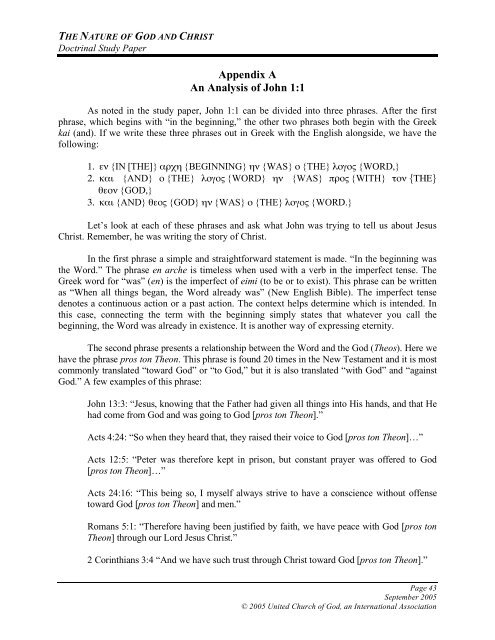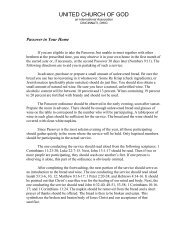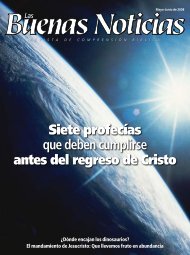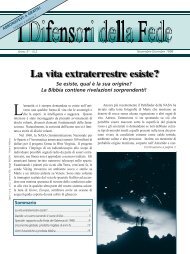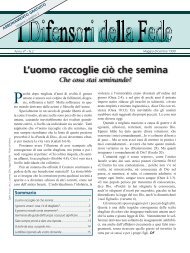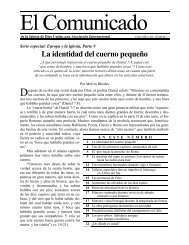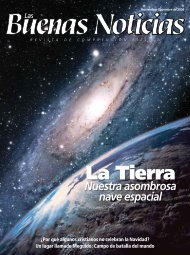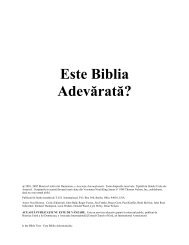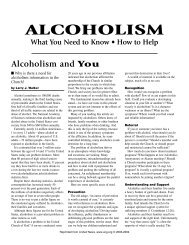The Nature of God and Christ - Members Site - United Church of God
The Nature of God and Christ - Members Site - United Church of God
The Nature of God and Christ - Members Site - United Church of God
- No tags were found...
You also want an ePaper? Increase the reach of your titles
YUMPU automatically turns print PDFs into web optimized ePapers that Google loves.
THE NATURE OF GOD AND CHRISTDoctrinal Study PaperAppendix AAn Analysis <strong>of</strong> John 1:1As noted in the study paper, John 1:1 can be divided into three phrases. After the firstphrase, which begins with “in the beginning,” the other two phrases both begin with the Greekkai (<strong>and</strong>). If we write these three phrases out in Greek with the English alongside, we have thefollowing:1. {IN [THE]} {BEGINNING} {WAS} {THE} {WORD,}2. {AND} {THE} {WORD} {WAS} {WITH} {} {GOD,}3. {AND} {GOD} {WAS} {THE} {WORD.}Let’s look at each <strong>of</strong> these phrases <strong>and</strong> ask what John was trying to tell us about Jesus<strong>Christ</strong>. Remember, he was writing the story <strong>of</strong> <strong>Christ</strong>.In the first phrase a simple <strong>and</strong> straightforward statement is made. “In the beginning wasthe Word.” <strong>The</strong> phrase en arche is timeless when used with a verb in the imperfect tense. <strong>The</strong>Greek word for “was” (en) is the imperfect <strong>of</strong> eimi (to be or to exist). This phrase can be writtenas “When all things began, the Word already was” (New English Bible). <strong>The</strong> imperfect tensedenotes a continuous action or a past action. <strong>The</strong> context helps determine which is intended. Inthis case, connecting the term with the beginning simply states that whatever you call thebeginning, the Word was already in existence. It is another way <strong>of</strong> expressing eternity.<strong>The</strong> second phrase presents a relationship between the Word <strong>and</strong> the <strong>God</strong> (<strong>The</strong>os). Here wehave the phrase pros ton <strong>The</strong>on. This phrase is found 20 times in the New Testament <strong>and</strong> it is mostcommonly translated “toward <strong>God</strong>” or “to <strong>God</strong>,” but it is also translated “with <strong>God</strong>” <strong>and</strong> “against<strong>God</strong>.” A few examples <strong>of</strong> this phrase:John 13:3: “Jesus, knowing that the Father had given all things into His h<strong>and</strong>s, <strong>and</strong> that Hehad come from <strong>God</strong> <strong>and</strong> was going to <strong>God</strong> [pros ton <strong>The</strong>on].”Acts 4:24: “So when they heard that, they raised their voice to <strong>God</strong> [pros ton <strong>The</strong>on]…”Acts 12:5: “Peter was therefore kept in prison, but constant prayer was <strong>of</strong>fered to <strong>God</strong>[pros ton <strong>The</strong>on]…”Acts 24:16: “This being so, I myself always strive to have a conscience without <strong>of</strong>fensetoward <strong>God</strong> [pros ton <strong>The</strong>on] <strong>and</strong> men.”Romans 5:1: “<strong>The</strong>refore having been justified by faith, we have peace with <strong>God</strong> [pros ton<strong>The</strong>on] through our Lord Jesus <strong>Christ</strong>.”2 Corinthians 3:4 “And we have such trust through <strong>Christ</strong> toward <strong>God</strong> [pros ton <strong>The</strong>on].”Page 43September 2005© 2005 <strong>United</strong> <strong>Church</strong> <strong>of</strong> <strong>God</strong>, an International Association


